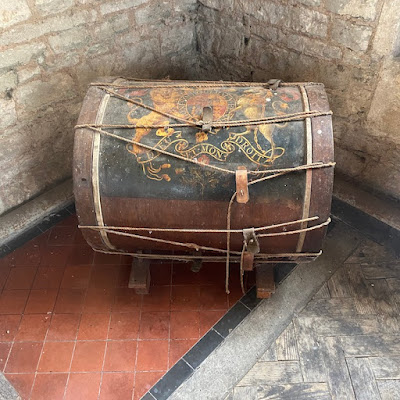Sunday, October 15, 2023
Chaceley, Gloucestershire
Worse things than serpents, or, Odd things in churches (17)
Finding this drum in a corner of St John’s church, Chaceley, made me wonder: was it some military relic,. put in the church for lack of anywhere else to keep it? Such an explanation seemed unlikely, in spite of the patriotic Hanoverian royal arms painted on the side of the instrument. The information available in the church offered a more likely story: that the drum was simply one of the instruments used in church music – it would have been played as part of an instrumental band that accompanied the singing of psalms, hymns, and the occasional anthem. Such bands were common between c. 1750 and c. 1850, before organs, harmoniums, and barrel organs started to become popular in parish churches. A common ensemble would consist mainly of stringed instruments (mainly violins and cellos), plus one or two woodwind – a clarinet, flute, and bassoon, perhaps. But such combinations were not fixed. In a small village especially, the church would get by with whatever and whoever was available.
This kind of instrumental accompaniment is sometimes called West gallery music, because the instrumentalists often played in the gallery at the west end of the church. The most famous literary evocation of such music is in Thomas Hardy’s novel Under the Greenwood Tree, in which the singers and musicians of Mellstock church (Mellstock is Hardy’s name for the real Dorset village of Stinsford) decry the coming fashion for harmoniums and barrel organs. Most of them agree that strings are best for church music, and some will admit that woodwinds have their place, even the unwieldy-looking bass instrument called the serpent (‘Yet there’s worse things than serpents’ as Mr Penny says). And drums? ‘Your drum-man is a rare bowel-shaker – good again,’ as another of Hardy’s characters puts it.
So if drum was available, a keen ‘bowel-shaker’ might well have been welcomed into the band. Even someone making a martial noise was better to the traditionalists of the 19th century than an organist or a player of the harmonium (‘that you blow wi’ your foot’). Bang on!
Subscribe to:
Post Comments (Atom)




No comments:
Post a Comment